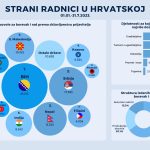As Poslovni Dnevnik/Darko Bicak writes on the 13th of September, 2019, the responsibility of Franck’s tasters and development team is very big, because they need to be able to decide whether to purchase a large amount of a certain type of coffee on the basis of a sample of a mere 300 to 500 grams of it.
Croats tend to prefer the so-called ”dark coffee” aromas, dominated by chocolate, hazelnut and almond flavours, and per capita, coffee consumption in this country ranges from around 5.2 to 6 kilograms, while the EU average is 5.8 kilograms.
Franck is Croatia’s oldest and largest roasting ”machine” and currently boasts a processing capacity of between 20 and 80 tonnes per day, depending on the season and of course, the product structure.
As Franck’s Zoran Škevin explained to Poslovni Dnevnik during a visit to the Zagreb factory, the capacity of receiving coffee is 10 tons per hour, and every day, Franck receive 4-6 units of coffee with an average of 26 tons of coffee per truck.
“We work with about 20 different coffees, and our raw materials come from countries around the equator. We keep an eye on what’s happening on the market, and since coffee is a commodity, we have to balance it well with seasonality and price and quality, which is a very complex business,” Škevin explained.
He added that Franck now has more than 170 different items in his portfolio, and 100 or so of them are coffee. Vesna Mihatov, who directs research, development and coffee supply at Franck, pointed out that the company has developed a total of 23 new products this year alone, including innovations such as Franck Coffee & GO.
There are also new Smart, Protein and Energy coffee beverages with the addition of functional ingredients including proteins, vitamins and minerals to respond to the growing trend of healthy eating and overall care for a more healthy lifestyle.
The Zagreb coffee factory pointed out that all of Franck’s products are made from premium raw materials, with a strategic focus on innovation and a well-established team of experts in the research, development and procurement of coffee and its subsequent production. The coffee is unloaded every day at Franck’s facilities in Zagreb in 60 kg bags. They explained that only raw materials with maximum positive properties are selected for the eventual production of coffees like Superior and others, or single-origin coffees such as Guatemala and Columbia.
The coffee arrives at Franck via various European ports from around 70 countries in the area located around the equator.
Once a sample is selected, the shipment is monitored all the time – during storage, before loading into the trucks at the port and before being shipped to Franck’s silo for raw coffee. Given the fact that there is a fully automated production system, all these rigorous pre-controls are necessary to ensure the same, consistent quality of coffee throughout the entire journey. Raw coffee is purchased on a sample basis, and Master Cuppers, or tasters are responsible for checking its quality.
“Man and his senses are still irreplaceable, despite all the measuring instruments at our disposal. If the Master Cupper senses that a particular sample of coffee in the cup has negative characteristics, or if it lacks the fullness, aromaticity and richness of taste to be had, then that type is rejected, even if the results of the previous analyses are in accordance with the standards. The responsibility of the Master Cupper and the entire development team is very big, because on the basis of a sample of only 300 to 500 grams, they need to be able to make a decision on buying large quantities of that coffee, ot even over 50 tons of it,” explained Vesna Mihatov.
The very process of “production” of coffee in Franck takes place so that the raw coffee, which has previously passed all the stringent tests, is unloaded onto the conveyor belt in the reception area and the receiving line capacity is 10 tons oer hour. This is followed by cleaning and the purified grains are transferred to silos, which have a total capacity of 1100 tonnes.
Make sure to follow our dedicated business and Made in Croatia pages for much more.







